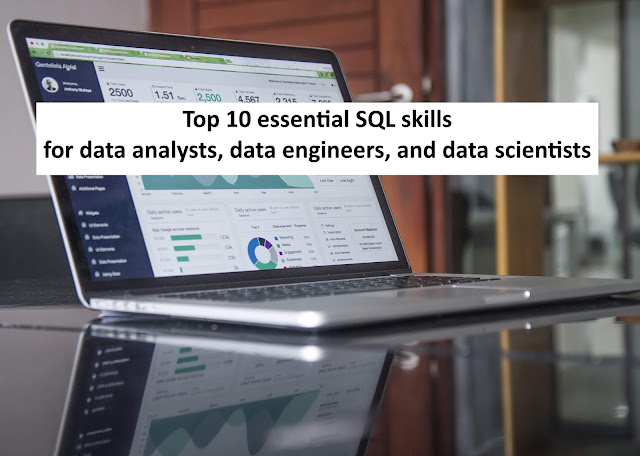Top 10 essential SQL skills for data analysts, data engineers, and data scientists
Photo by Carlos Muza on Unsplash
Mastering the commonly used SQL concepts is essential to work effectively as a data analyst, data engineer, and data scientist in today's world.
The following are the top 10 skills for mastering SQL:
1. Knowing SQL Fundamentals:
Understanding the following keywords is essential to write common DML queries: SELECT, FROM, WHERE, GROUP BY, HAVING, ORDER BY, WINDOW\RANK FUNCTIONS.
2. Understanding different real-world scenarios:
Analyzing and understanding multiple domains and how to use SQL, like writing complex queries, manipulating data, pulling reports, and identifying patterns and trends in data in real-world scenarios, are important.
3. Enhancing problem-solving skills:
Online data sets are good tools to simulate real-world SQL challenges in multiple domains.
4. Query optimization and performance tuning techniques:
Skills to write optimized SQL queries and to improve the performance of existing queries are essential. Those skills are highly prized in the industry. Identifying and resolving performance bottlenecks and improving the overall performance are important.
5. Handle NULL values:
Consider handling NULLs gracefully using built-in functions (like COALESCE, NULLIF, CASE, etc.).
6. Use of Joins and Subqueries:
Identify scenarios to use joins and subqueries effectively.
7. Aggregate Functions:
Aggregate functions like COUNT, SUM, COUNT, AVG, MAX, and MIN are widely used to extract meaningful insights and to define calculated columns.
8. Rank/Window Functions:
After performing aggregate functions, you may have to use rank functions to allocate ranks to each row in a group. For that, we need to first identify: Rank what? Within which group? Rank by what?
9. Proper Error Handling and Troubleshooting:
Knowing error handling techniques and debugging SQL queries are important.
10. Database-specific knowledge:
Different clients may have different database systems, such as MySQL, PostgreSQL, SQL Server, etc. Knowing the features specific to each database is important to get a good grip on different client requirements.
Here are some of the best online courses to learn SQL for data scientists:
Photo by S O C I A L . C U T on Unsplash
SQL for Data Science by UC Davis :
Source: Coursera.
Covers: SQL basics, data manipulation, and joins.
Databases and SQL for Data Science by IBM :
Source: Coursera.
Covers: SQL basics, data manipulation, and joins.
SQL for Data Science by IBM : --
Source: edX .
Covers SQL basics, data manipulation, subqueries and joins.
Source: Udemy.
Covers: SQL basics, data manipulation, and joins.
SQL for Data Science with Google Big Query :
Source: Udemy .
Covers: SQL basics, data manipulation, subqueries and joins.
SQL & Database Design A-Z™: Learn MS SQL Server + PostgreSQL :
Source: Udemy .
Covers SQL basics, data manipulation, DB design, joins etc.
Source: Udacity.
Covers :SQL basics.
Source: DataCamp .
Covers: SQL basics, data manipulation, grouping and joins.
.jpg)



Comments
Post a Comment